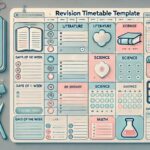A-level Sciences are considered to be the hardest A-levels by students and teachers alike. Whether you’re preparing for all three – Biology, Chemistry, Physics, or any combination of these subjects, it’s crucial to equip yourself with effective revision techniques that will set you up for success.
Navigating the world of A-Level Science revision can feel overwhelming, but fear not! With the right approach and mindset, you can tackle even the most challenging topics with ease.
From creating a structured revision timetable to exploring diverse learning materials and practicing past papers, we’ll cover everything you need to know to maximise your study efforts.
By understanding the assessment objectives, trying different learning methods, and prioritising self-care, you’ll not only enhance your academic performance but also develop valuable lifelong skills.
Plan Your A-level Science Revision
- Effective revision starts with a well-structured plan. Take the time to create a detailed revision timetable that allocates specific slots for each subject, topic, and type of revision activity.
- Be realistic about your goals and avoid overloading yourself with too much content in one day. Break down each subject into manageable chunks and assign revision sessions accordingly.
- Consider your strengths and weaknesses, focusing more time on areas where you need improvement while still dedicating time to reinforce your understanding of topics you’re already confident in.
- Remember to incorporate breaks into your schedule to avoid burnout and maintain productivity. Balancing study sessions with relaxation time is essential for keeping your mind fresh and engaged.
- Furthermore, don’t forget to review your timetable regularly and adjust it as needed based on your progress and upcoming deadlines.
- Flexibility is key to ensuring that your revision plan remains effective and adaptable to your evolving needs.
By planning your revision in advance, you’ll not only stay organised and motivated but also maximise your chances of success in your A-Level Science exams. So, grab your calendar and start mapping out your path to exam readiness!
Understand the A-level Assessment Objectives
Before diving into your revision, it’s essential to have a clear understanding of the assessment objectives for your A-Level Science exams.
These objectives outline what you’ll be tested on and how your knowledge and skills will be assessed.
Take the time to familiarise yourself with the exam specifications provided by your exam board. These documents detail the content you need to cover and the criteria against which your performance will be evaluated.
Once you’ve grasped the assessment objectives, tailor your revision accordingly. Focus on key concepts and skills that align with the exam requirements.

Prioritise topics that are weighted more heavily in the assessment, ensuring that you allocate sufficient time to cover them thoroughly.
Additionally, consider the format of the exam questions and practice answering them in a manner that demonstrates your understanding and application of the subject matter.
Understanding the expectations of the examiners will help you approach your revision with clarity and purpose.
By aligning your revision efforts with the assessment objectives, you’ll be better equipped to target your study sessions effectively and maximise your performance on exam day. So, delve into the assessment criteria and pave the way for exam success!
Try Different Learning Methods
Exploring various learning techniques can inject excitement into your revision process and enhance your understanding of A-Level Science topics. Instead of sticking to one method, experiment with different approaches to discover what works best for you.
If you’re accustomed to reading and note-taking, why not shake things up by incorporating visual aids? Create colorful mind maps or diagrams to visualise complex concepts and make connections between different ideas.
Visual representations can stimulate your memory and offer a fresh perspective on the material.Similarly, if you’re a verbal learner, consider explaining concepts aloud to yourself or teaching them to a friend.
Engaging in discussions or debates about scientific principles can deepen your comprehension and highlight areas where further study is needed.
For those who thrive on hands-on experiences, practical experiments and demonstrations can bring theoretical concepts to life.
Seek out interactive simulations or conduct different strategies in your own home to reinforce your understanding through practical application.
Additionally, leverage online resources such as educational videos, podcasts, and interactive quizzes, blog with tips to supplement your learning.
These multimedia tools provide alternative explanations and allow you to reinforce your understanding in engaging ways.
By diversifying your learning methods, you’ll not only keep your revision sessions dynamic and engaging but also cater to different aspects of your learning style, ultimately leading to a more comprehensive grasp of A-Level Science concepts. So, embrace experimentation and embrace the journey of discovery in your revision process!
6 ways to improve your A-level Science Revision
Use Diverse Learning Materials – Don’t limit your revision to textbooks alone; broaden your horizons by exploring a variety of learning resources tailored to your A-Level Science studies.
Embracing diverse materials can offer fresh perspectives, deepen your understanding, and make your revision journey more engaging.
Beyond traditional textbooks, delve into the wealth of educational content available online. Explore reputable websites, watch insightful documentaries, and tune into podcasts that delve into scientific topics relevant to your syllabus.
These multimedia resources offer dynamic and interactive ways to absorb information, catering to different learning styles and preferences.
Additionally, don’t hesitate to tap into supplementary materials provided by your teachers or recommended by peers. Seek out articles, research papers, and academic journals that delve deeper into specific areas of interest or clarify complex concepts.

These additional readings can provide valuable insights and complement your textbook knowledge.
Furthermore, consider incorporating visual aids such as diagrams, infographics, and flashcards into your revision arsenal. These visual representations can simplify abstract concepts, aid memory retention, and facilitate quick review sessions.
Lastly, don’t underestimate the power of practical application. Engage in hands-on activities, conduct experiments, and participate in laboratory sessions whenever possible.
Applying theoretical knowledge to real-world scenarios reinforces understanding and cultivates essential practical skills.
By embracing a diverse range of learning materials, you’ll enrich your revision experience, deepen your understanding of A-Level Science topics, and approach exams with confidence and clarity.
So, venture beyond the confines of traditional study materials and embark on a journey of discovery with diverse learning resources!
Practice Past Papers
One of the most effective ways to prepare for your A-Level Science exams is by practicing past papers. Past papers serve as invaluable tools for familiarising yourself with the exam format, understanding the types of questions asked, and honing your exam technique.
Start by acquiring past papers from reliable sources, such as your teachers, exam boards’ websites, or reputable revision platforms.Organise these papers by topic and difficulty level to ensure a structured approach to your revision.
Allocate dedicated study sessions to work through past papers under timed conditions, replicating the exam environment as closely as possible. Aim to complete each paper within the allocated time frame to build stamina and improve time management skills.
After completing a past paper, thoroughly review your answers and identify areas of strength and weakness. Pay attention to any recurring themes or topics that consistently challenge you. Use these insights to guide your future revision priorities and focus on areas that require further attention.

Additionally, consider seeking feedback from your teachers or peers on your answers to past papers. Their input can offer valuable perspectives and highlight areas for improvement that you may have overlooked.
As you progress through your revision journey, revisit past papers regularly to track your progress and measure your performance. Use them as diagnostic tools to gauge your understanding of key concepts and identify any gaps in your knowledge that need addressing.
By incorporating past papers into your revision routine, you’ll build confidence, enhance your exam skills, and increase your chances of success in your A-Level Science exams. So, embrace the opportunity to learn from the past and pave the way for a brighter academic future!
Take Regular Breaks
Revision can be mentally demanding, and it’s essential to give your brain the rest it needs to recharge. Incorporating regular breaks into your study routine is crucial for maintaining focus, productivity, and overall well-being.
Plan your study sessions in manageable blocks of time, typically around 25 to 30 minutes, followed by a short break of 5 to 10 minutes.
During these breaks, step away from your study area and engage in activities that help you relax and unwind.
Physical movement is beneficial during breaks, so consider taking a short walk, stretching, or doing some light exercise to re-energise your body and mind. You could also listen to music, meditate, or indulge in a healthy snack to refresh yourself.
Avoid the temptation to power through extended study periods without breaks, as this can lead to burnout, decreased concentration, and reduced retention of information.

Remember that quality study time is more important than quantity, and regular breaks are essential for maintaining optimal cognitive function.
Use breaks as an opportunity to reflect on your progress, reassess your goals, and plan the next steps in your revision strategy.
Taking a moment to step back and evaluate your approach can help you stay on track and make any necessary adjustments to your study plan.
By prioritising regular breaks, you’ll enhance your ability to absorb and retain information, improve your overall well-being, and ensure that your revision sessions are as effective as possible. So, don’t underestimate the power of taking a breather – it’s an essential part of the revision process!
Minimise Distractions
Creating an environment conducive to focused study is vital for productive revision sessions. Minimising distractions ensures that you can fully engage with your study material, leading to more effective learning outcomes.
Start by identifying potential distractions in your study area and taking steps to eliminate or reduce them. This might mean turning off your phone or placing it in another room, closing unnecessary tabs on your computer, or finding a quiet space away from noisy environments.
Establishing a dedicated study space can also help minimise distractions. Choose a location where you feel comfortable and free from interruptions, whether it’s a quiet corner of your home, a library, or a coffee shop.

Make sure your study area is well-lit, organised, and free from clutter to promote focus and concentration. Setting boundaries with family members, roommates, or housemates can also help minimise interruptions during your study sessions.
Let them know when you’ll be studying and ask for their cooperation in respecting your dedicated study time.
Consider using productivity tools or apps to help you stay focused and minimise distractions. Apps like Forest or Freedom can block distracting websites and apps, allowing you to concentrate fully on your revision tasks.
Finally, remember to take regular breaks to prevent burnout and maintain mental clarity. By minimising distractions and creating a conducive study environment, you’ll maximise your productivity and make the most of your revision time.
Prioritise Sleep and Nutrition
Maintaining a healthy lifestyle is crucial during the intense period of A-level science revision. Prioritising both sleep and nutrition can significantly impact your ability to focus, retain information, and perform well in your exams.
Ensure you’re getting between 7 to 9 hours of sleep each night to allow your brain to rest and consolidate information. Adequate sleep improves cognitive function, memory retention, and overall academic performance.
Establish a regular sleep schedule and create a relaxing bedtime routine to promote better sleep quality. In addition to sleep, paying attention to nutrition is essential for optimal brain function. Fuel your body and mind with a balanced diet rich in fruits, vegetables, whole grains, lean proteins, and healthy fats.

Avoid excessive consumption of sugary snacks and caffeine, as they can lead to energy crashes and difficulty concentrating. Stay hydrated by drinking plenty of water throughout the day.
Dehydration can impair cognitive function and diminish your ability to focus, so aim to drink at least eight glasses of water daily.
Plan nutritious meals and snacks ahead of time to avoid reaching for unhealthy options when studying. Incorporate brain-boosting foods like nuts, seeds, berries, and leafy greens into your diet to support cognitive function and memory.
By prioritising sleep and nutrition, you’ll provide your body and brain with the fuel they need to excel during the demanding A-level science revision period. Taking care of your physical health will ultimately contribute to your academic success.
Practice Consistently
Consistent practice is the key to mastering A-level science revision. Rather than cramming all your studying into a few intense sessions, establish a regular study routine to reinforce your understanding of the material over time.
Allocate dedicated study sessions throughout the week and stick to a structured timetable.
Break down your revision into manageable chunks, focusing on one topic or concept at a time. This approach allows for deeper comprehension and better retention of information.
Utilise a variety of study methods to keep your revision sessions engaging and effective. Experiment with flashcards, summarising notes, and teaching concepts to others to reinforce your understanding from different angles.
Set realistic goals for each study session and track your progress over time. Celebrate your achievements along the way to stay motivated and maintain momentum in your revision journey.
Consistency is key when it comes to practicing past papers. Incorporate regular practice exams into your study schedule to familiarise yourself with the exam format, timing, and question styles. Review your performance, identify areas for improvement, and adjust your study plan accordingly.
By committing to consistent practice, you’ll build confidence, strengthen your knowledge base, and be well-prepared to tackle your A-level science exams with ease. Remember, small, consistent efforts add up to significant progress over time.

Stay Motivated
Staying motivated during A-level science revision can be challenging, but it’s essential for success. Here are some tips to keep you inspired and focused throughout your revision journey.
- Set Clear Goals – Establish specific, achievable goals for your revision. Whether it’s improving your understanding of a challenging topic or achieving a certain grade, having clear objectives will give you direction and purpose.
- Break it Down – Revision can feel overwhelming, so break it down into smaller, manageable tasks. Focus on one topic or section at a time, and celebrate your progress as you tick off each milestone.
- Mix it Up – Keep your revision sessions interesting by varying your study techniques. Experiment with different methods such as flashcards, mind maps, or teaching concepts to others. Find what works best for you and keeps you engaged.
- Stay Positive – Maintain a positive mindset throughout your revision. Instead of dwelling on setbacks or mistakes, focus on what you’ve achieved and how far you’ve come. Positive thinking can boost your confidence and motivation
- Reward Yourself -Treat yourself for reaching milestones or completing challenging tasks. Whether it’s a small indulgence like a favourite snack or a fun activity with friends, rewards can provide motivation to keep pushing forward.
- Stay Organised – Keep your study space tidy and organised to minimise distractions and maximise productivity. Set aside dedicated time for revision each day and stick to your schedule.
- Seek Support – Don’t be afraid to reach out for help if you’re struggling. Whether it’s from teachers, peers, or family members, support and encouragement can make a big difference in staying motivated.

Kora F.
Maths | Chemistry | Biology Tutor
Student at UNIVERSITY OF LEEDS
£17 Per session
Book Free TrialTo Sum Up
mastering your A-level science exams is within reach with the right approach. By planning your revision effectively, understanding assessment objectives, and exploring diverse learning methods, you can enhance your understanding and retention of key concepts.
Practice past papers regularly, take breaks to recharge your mind, and minimise distractions to maintain focus during study sessions. Prioritising adequate sleep and nutrition will ensure your brain is functioning optimally.
For additional support and guidance, consider Edumentors. A-level science tutor can offer personalised assistance to help you overcome challenges and achieve your academic goals. With their expert guidance, you can stay motivated and gain the confidence needed to excel in your exams.
Remember, success is not just about working hard, but also working smart. With perseverance and the right support system, you can unlock your full potential and pave the way for a bright future.







